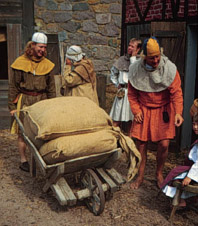Meet the Middle Ages
BackCastellanies

The King controlled his kingdom from the castles. Every castle was responsible for a certain district. The district, or castle county ("slottslän"), varied in size and importance depending on where it lay. The border districts were very important.
At the castles, there were Royal bailiffs who governed the districts. The Bailiff made sure that the peasants paid their taxes, both the ordinary ones and the occasional extra ones. The peasants who farmed the land belonging to the Crown paid a fee for the maintenance of the castle and for the wages of the soldiers and the servants. This fee was paid in money or farm produce. All peasants were obliged to do labour service at the castle at the Bailiff´s demand. The castle needed constant repairs and additional building was often done.
The King controlled his country from the castles. The bailiffs sent their men to see to that everything was calm, that everyone paid their taxes and that no uprising was underway. Many bailiffs had a bad reputation as ruthless and cruel men.
Sometimes the King would give away a district to a nobleman, who then also had the power to rule it. This was called a fief. The nobleman earned his living from the peasant ´s taxes and in return he was responsible for the defence of the region. Some noblemen got a fief in return for lending money to the King. The income gained from the district was a payment of the loan. The bailiffs of the fief could be very hard, since they had to bring in as much money as possible.